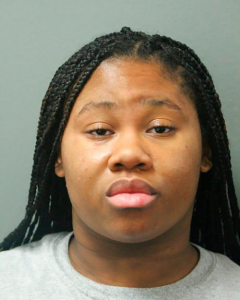Willa and Charles Bruce were one of many Black families whose land was stolen from them. But nearly a century after being robbed of their California beachfront, their descendants have finally gotten it back.
Willa and Charles Bruce were one of many Black families whose land was stolen from them. But nearly a century after being robbed of their California beachfront, their descendants have finally gotten it back.
By Liz Dwyer | Word In Black
(WIB) – There’s a story in my family of how some of my relatives left Georgia and came to the Chicagoland area in the early 1920s. It starts with my grandmother’s brother being lynched and ends with the family fleeing for their lives — leaving the land they owned behind.
I’ve always wondered what happened to that land. Which of those white men with guns and torches decided it now belonged to them, and what would happen if I was able to track down the records and prove that the land had been stolen? Could I get it back?
Black America hasn’t had a prominent example of a Black family pursuing reparative justice and actually getting back land that’s rightfully theirs. At least, until now.
On July 20, 2022, in the Los Angeles suburb of Manhattan Beach, California, ownership of Bruce’s Beach officially went back to the descendants of Charles and Willa Bruce, a Black couple who opened a resort on the land in 1912, only to have it snatched away in 1924.
“I think if anyone knows how hard it is to become dispossessed — that in itself is a grave puncture,” Derrick Bruce, one of Charles and Willa’s great-grandsons told NBC News in an interview. “And so that’s what our family has gone through — a grave wounding.”
Charles and Willa Bruce were terrorized by the Ku Klux Klan, and when that didn’t drive them away, the City of Manhattan Beach stripped them of the property through eminent domain.
Bernard Bruce, the son of Willa and Charles, told the Los Angeles Times in 2007 that people laughed at him when he told them his family had owned the beachfront property in now wealthy, lily-white Manhattan Beach.
“These people, they worked on the railroad, they saved their money, they put up a resort and they lost everything,” Bernard Bruce said. “How would you feel if your family owned the Waldorf and they took it away from you?”
Manhattan Beach is less than 1% Black. When I moved to Los Angeles in 1998 to teach in Compton, I was told in no uncertain terms by older Black teachers at my school that the city was one of those places I should steer clear of if I didn’t want to get pulled over or harassed by police.
Many African Americans have stories like mine and like the Bruce’s in our family histories.
When award-winning spoken word artist and poetic activist Kavon Ward moved to Manhattan Beach in 2017, she already knew about the Bruce’s story of stolen land — and then she experienced the city’s racism first-hand.
“It’s like: You kicked the Bruces out, but you’re not going to run me out,” Ward told the Times in 2020. “So if I’m not leaving, I’ve got to fight to make it better.”
And so, in the wake of George Floyd’s murder, when Juneteenth 2020 came around, Ward decided to take action and held a commemoration at Bruce’s Beach. She also formed Justice for Bruce’s Beach, “a community grassroots movement, continuing the good fight to obtain REPARATIONS for the Bruce family through RESTITUTION and RESTORATION of their land.”
“The ancestors are here. Feel it,” an emotional Ward said at the ceremony to return the land to the Bruce family.
“I had a vision. A vision which has been fully realized today. A vision that what was once taken from a people be returned. A vision that something that had never been done before in history happened for the first time,” she said.
And if it can happen in Manhattan Beach, what does it mean for the rest of us?
Many African Americans have stories like mine and like the Bruce’s in our family histories — stories of our ancestors who pursued the American dream. They worked hard, saved up, bought land, built houses, started businesses, and then had everything snatched away by mobs, convenient legal statutes, or other forms of racial terrorism. Sometimes it was just too painful for our elders to recount exactly what happened to them, but some of us grew up hearing bits and pieces of these stories around the dinner table and at family reunions. And what’s clear is that our families deserve to have back what was stolen.
Such a meaningful event yesterday presenting the recorded deed transferring Bruce’s Beach back to the family heirs with Supervisors @HollyJMitchell and @SupJaniceHahn. The record of this transfer is preserved in perpetuity as a public record. pic.twitter.com/B0ssG5Jw8f— Los Angeles County Registrar-Recorder/County Clerk (@LACountyRRCC) July 21, 2022
Since the murder of George Floyd, the rumblings about reparations that have buzzed in the background have turned into a roar. As Sacramento Observer publisher Larry Lee wrote earlier this year, reparations for Black people is the most important issue of our time.
“We have set the precedent in the pursuit of justice,” Janice Hahn, a member of the Los Angeles Board of Supervisors and one of the champions of the Bruce family’s efforts, said during the ceremony. “Today, we are returning stolen land for the first time, but it will not be the last.”
“As reparations and restitution cases go, this one will probably be the easiest to accomplish,” Hahn told NBC. “We have the records that show the actual piece of property that was bought by Willa and Charles Bruce. And then we have the records of the harassment that they went through.”
Many of us don’t have those records — I’m pretty sure my family, which isn’t even clear about what the name of one of my great-grandmothers was — does not. But that doesn’t mean we should stop agitating for reparations and demanding justice and compensation for what was stripped away from our families and from our African American brothers and sisters across this nation.
Derrick Bruce told NBC, his family was denied the generational wealth that could have been possible.
The movement toward reparative justice in California with the state’s Reparations Task Force, and now the return of Bruce’s Beach is a beacon of hope for us all — and a reminder that even if it takes 100 years to achieve justice, it’s still worth pursuing.
Hahn told NBC that Manhattan Beach’s “current city council has refused to apologize to the Bruce’s for what happened 100 years ago.” Although Los Angeles County has offered to purchase the land outright for $20 million, the Bruce family plans to lease it back to the county, for now.
As Derrick Bruce told NBC, his family was denied the generational wealth that could have been possible, and the family suffered, making the return of the land a “bittersweet moment.”
But this moment proves what’s possible — so let it be a reminder to us all: When it comes to achieving racial justice and righting wrongs, we won’t be stopped. Not now, not ever.




